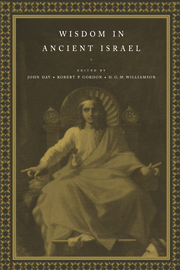Book contents
- Frontmatter
- Contents
- List of abbreviations
- Introduction
- Part 1 The ancient near eastern setting
- Part 2 Old Testament and Apocryphal texts
- 4 Foreign Semitic influence on the wisdom of Israel and its appropriation in the book of Proverbs
- 5 The limits of theodicy as a theme of the book of Job
- 6 Qoheleth
- 7 A house divided: wisdom in Old Testament narrative traditions
- 8 Wisdom in Solomonic historiography
- 9 Amos and wisdom
- 10 Hosea and the wisdom tradition: dependence and independence
- 11 Isaiah and the wise
- 12 Jeremiah and the wise
- 13 The wisdom psalms
- 14 Wisdom and Daniel
- 15 Ecclesiasticus: a tract for the times
- 16 The Christian use and the Jewish origins of the Wisdom of Solomon
- Part 3 Themes
- Biographical note: John Adney Emerton
- Bibliography of the works of John Adney Emerton
- Indexes
- Principal biblical and apocryphal references
14 - Wisdom and Daniel
Published online by Cambridge University Press: 16 October 2009
- Frontmatter
- Contents
- List of abbreviations
- Introduction
- Part 1 The ancient near eastern setting
- Part 2 Old Testament and Apocryphal texts
- 4 Foreign Semitic influence on the wisdom of Israel and its appropriation in the book of Proverbs
- 5 The limits of theodicy as a theme of the book of Job
- 6 Qoheleth
- 7 A house divided: wisdom in Old Testament narrative traditions
- 8 Wisdom in Solomonic historiography
- 9 Amos and wisdom
- 10 Hosea and the wisdom tradition: dependence and independence
- 11 Isaiah and the wise
- 12 Jeremiah and the wise
- 13 The wisdom psalms
- 14 Wisdom and Daniel
- 15 Ecclesiasticus: a tract for the times
- 16 The Christian use and the Jewish origins of the Wisdom of Solomon
- Part 3 Themes
- Biographical note: John Adney Emerton
- Bibliography of the works of John Adney Emerton
- Indexes
- Principal biblical and apocryphal references
Summary
According to J. M. Schmidt, L. Noack, writing in 1857, was the first scholar to describe apocalyptic as the product of wisdom. Some while before this, however, J. G. Eichhorn had claimed that what Daniel learnt in Babylon in the sixth century BC had contributed in a significant way to his book. More recently, discussion of such topics has usually taken as its starting-point G. von Rad's assertion that the roots of apocalyptic are to be found in wisdom, and not, as is frequently supposed, in prophecy. But, because this theory has rightly not won wide acceptance, and also because E. W. Nicholson and M. A. Knibb have provided valuable summaries and critiques both of von Rad's position and of the responses of other scholars to it, there is no need to cover this ground again here. Instead, attention will be concentrated on a modified form of von Rad's hypothesis which has a number of adherents.
Von Rad himself includes the interpretation of dreams among the activities of the wise, and in the fourth edition of his Theologie des Alien Testaments he gives this increased prominence as a factor which lies behind the emergence of apocalyptic. H.-P. Müller sees here the key to a correct understanding of the link between wisdom and apocalyptic. He believes that apocalyptic is related, not to the wisdom movement in general, as von Rad holds, but more specifically to mantic wisdom, though he recognizes that other sources, such as the prophetic movement, have also made important contributions to it.
- Type
- Chapter
- Information
- Wisdom in Ancient Israel , pp. 161 - 169Publisher: Cambridge University PressPrint publication year: 1995

